Organizational Behavior Report: Tesco, Culture, Motivation, Teams
VerifiedAdded on 2023/01/16
|12
|2642
|45
Report
AI Summary
This report delves into the multifaceted aspects of organizational behavior, examining the impact of culture, politics, and power dynamics on individual and team performance within an organization, using Tesco as a case study. It explores the application of content and process theories of motivation, such as Maslow's hierarchy of needs and Vroom's expectancy theory, to enhance employee engagement and achieve organizational goals. Furthermore, the report contrasts effective and ineffective teams, utilizing Tuckman's stages of team development and highlighting crucial factors like communication and leadership. Finally, it analyzes various philosophies of organizational behavior, including path-goal theory, to guide employees and improve overall performance within the organizational context.
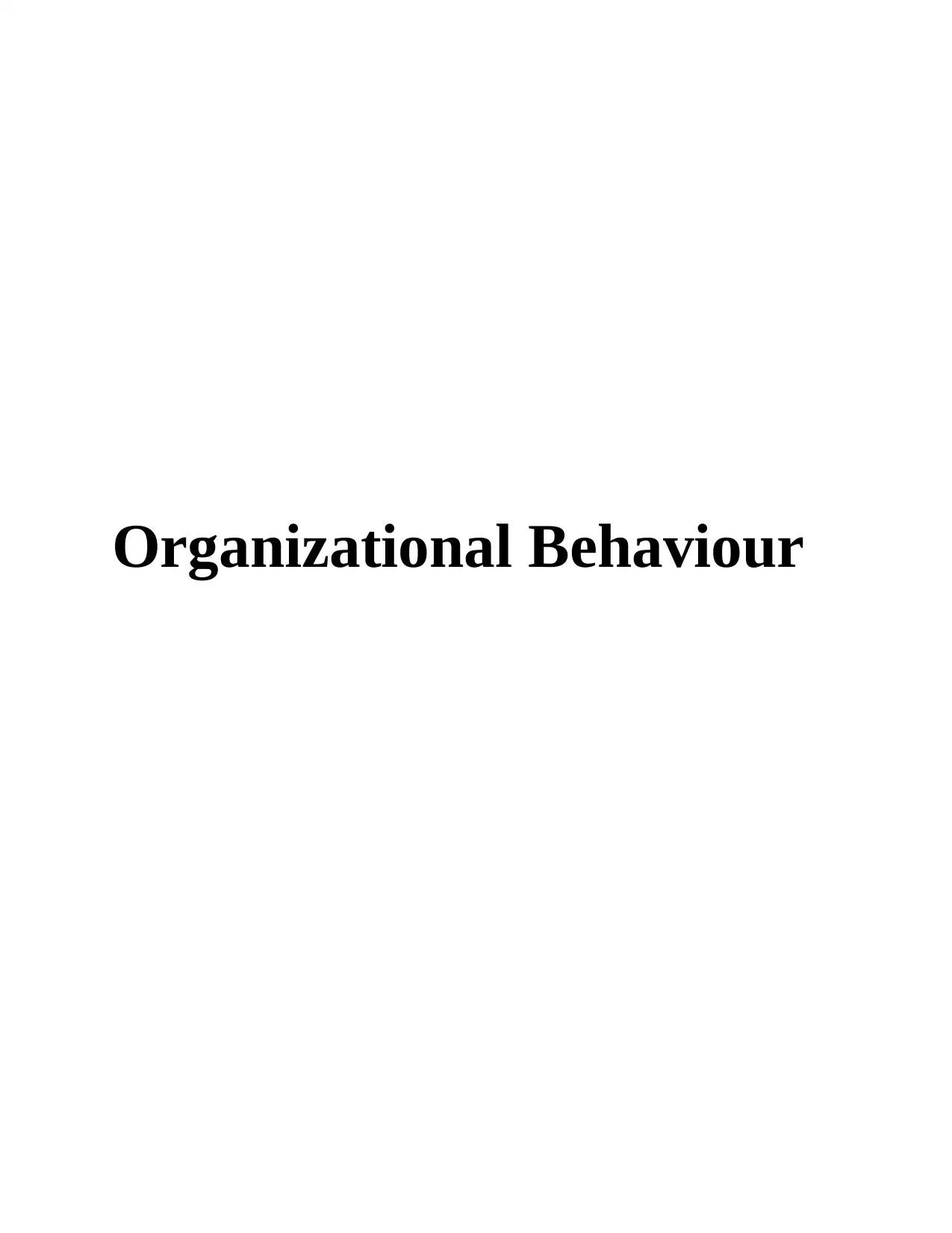
Organizational Behaviour
Paraphrase This Document
Need a fresh take? Get an instant paraphrase of this document with our AI Paraphraser
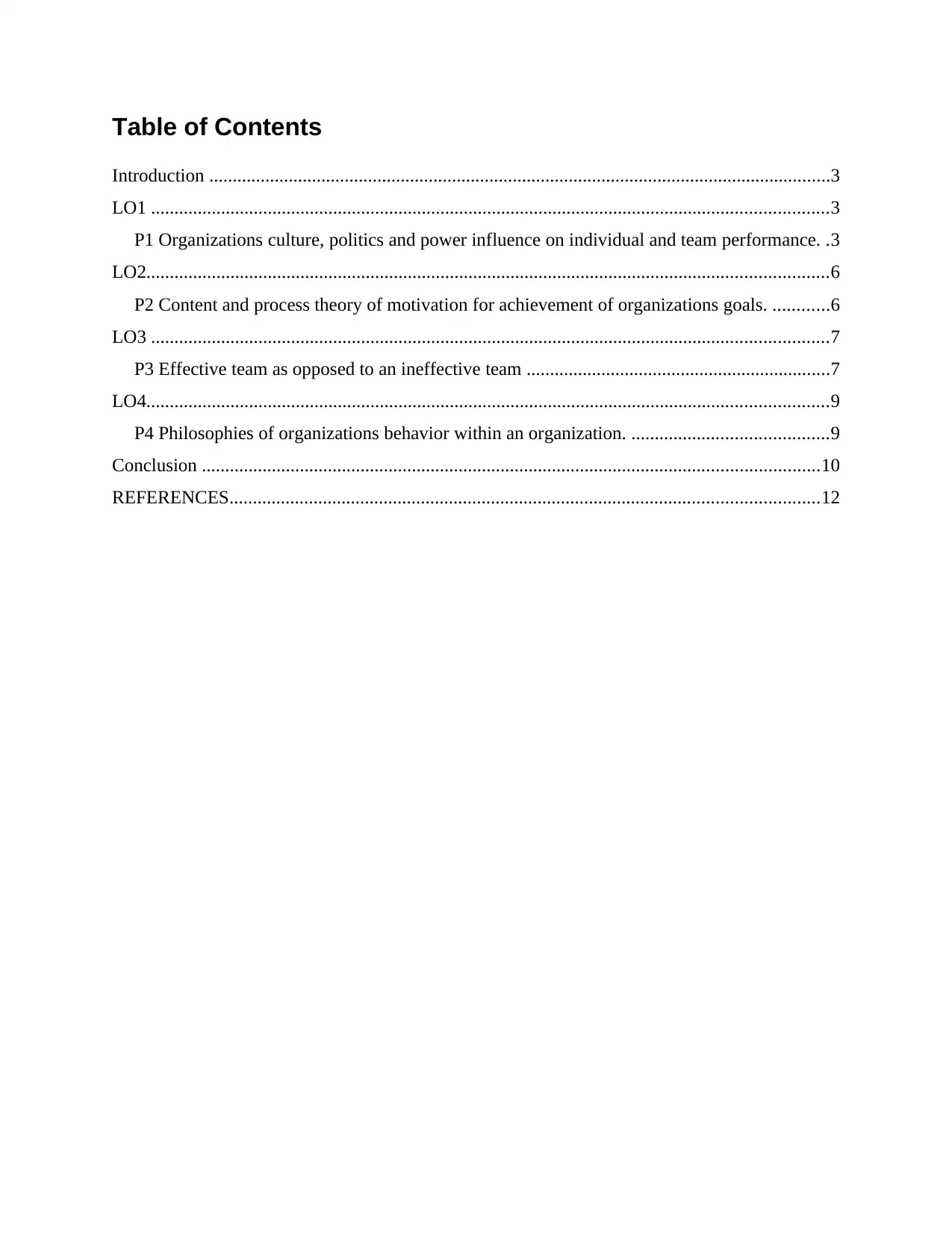
Table of Contents
Introduction .....................................................................................................................................3
LO1 .................................................................................................................................................3
P1 Organizations culture, politics and power influence on individual and team performance. .3
LO2..................................................................................................................................................6
P2 Content and process theory of motivation for achievement of organizations goals. ............6
LO3 .................................................................................................................................................7
P3 Effective team as opposed to an ineffective team .................................................................7
LO4..................................................................................................................................................9
P4 Philosophies of organizations behavior within an organization. ..........................................9
Conclusion ....................................................................................................................................10
REFERENCES..............................................................................................................................12
Introduction .....................................................................................................................................3
LO1 .................................................................................................................................................3
P1 Organizations culture, politics and power influence on individual and team performance. .3
LO2..................................................................................................................................................6
P2 Content and process theory of motivation for achievement of organizations goals. ............6
LO3 .................................................................................................................................................7
P3 Effective team as opposed to an ineffective team .................................................................7
LO4..................................................................................................................................................9
P4 Philosophies of organizations behavior within an organization. ..........................................9
Conclusion ....................................................................................................................................10
REFERENCES..............................................................................................................................12
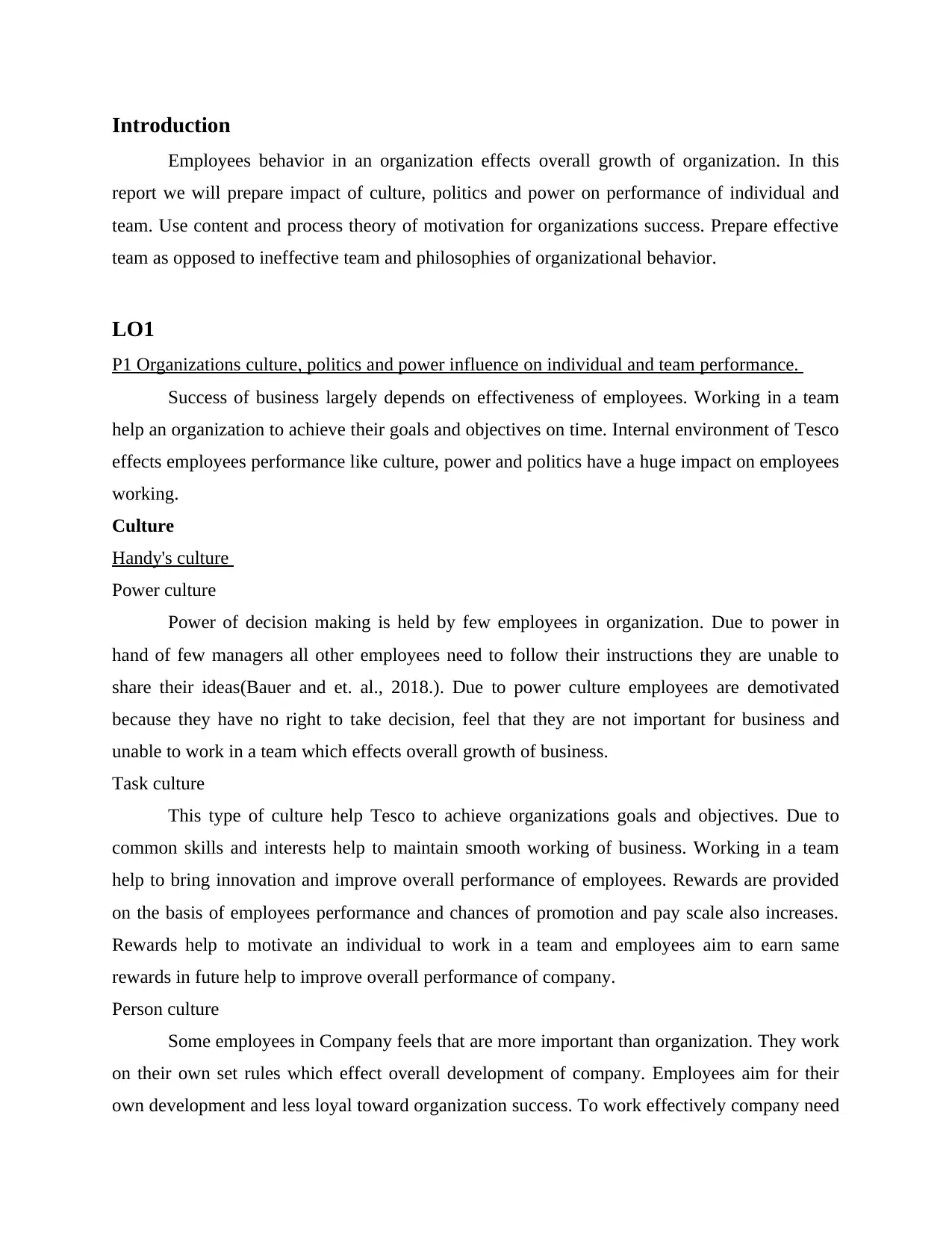
Introduction
Employees behavior in an organization effects overall growth of organization. In this
report we will prepare impact of culture, politics and power on performance of individual and
team. Use content and process theory of motivation for organizations success. Prepare effective
team as opposed to ineffective team and philosophies of organizational behavior.
LO1
P1 Organizations culture, politics and power influence on individual and team performance.
Success of business largely depends on effectiveness of employees. Working in a team
help an organization to achieve their goals and objectives on time. Internal environment of Tesco
effects employees performance like culture, power and politics have a huge impact on employees
working.
Culture
Handy's culture
Power culture
Power of decision making is held by few employees in organization. Due to power in
hand of few managers all other employees need to follow their instructions they are unable to
share their ideas(Bauer and et. al., 2018.). Due to power culture employees are demotivated
because they have no right to take decision, feel that they are not important for business and
unable to work in a team which effects overall growth of business.
Task culture
This type of culture help Tesco to achieve organizations goals and objectives. Due to
common skills and interests help to maintain smooth working of business. Working in a team
help to bring innovation and improve overall performance of employees. Rewards are provided
on the basis of employees performance and chances of promotion and pay scale also increases.
Rewards help to motivate an individual to work in a team and employees aim to earn same
rewards in future help to improve overall performance of company.
Person culture
Some employees in Company feels that are more important than organization. They work
on their own set rules which effect overall development of company. Employees aim for their
own development and less loyal toward organization success. To work effectively company need
Employees behavior in an organization effects overall growth of organization. In this
report we will prepare impact of culture, politics and power on performance of individual and
team. Use content and process theory of motivation for organizations success. Prepare effective
team as opposed to ineffective team and philosophies of organizational behavior.
LO1
P1 Organizations culture, politics and power influence on individual and team performance.
Success of business largely depends on effectiveness of employees. Working in a team
help an organization to achieve their goals and objectives on time. Internal environment of Tesco
effects employees performance like culture, power and politics have a huge impact on employees
working.
Culture
Handy's culture
Power culture
Power of decision making is held by few employees in organization. Due to power in
hand of few managers all other employees need to follow their instructions they are unable to
share their ideas(Bauer and et. al., 2018.). Due to power culture employees are demotivated
because they have no right to take decision, feel that they are not important for business and
unable to work in a team which effects overall growth of business.
Task culture
This type of culture help Tesco to achieve organizations goals and objectives. Due to
common skills and interests help to maintain smooth working of business. Working in a team
help to bring innovation and improve overall performance of employees. Rewards are provided
on the basis of employees performance and chances of promotion and pay scale also increases.
Rewards help to motivate an individual to work in a team and employees aim to earn same
rewards in future help to improve overall performance of company.
Person culture
Some employees in Company feels that are more important than organization. They work
on their own set rules which effect overall development of company. Employees aim for their
own development and less loyal toward organization success. To work effectively company need
⊘ This is a preview!⊘
Do you want full access?
Subscribe today to unlock all pages.

Trusted by 1+ million students worldwide
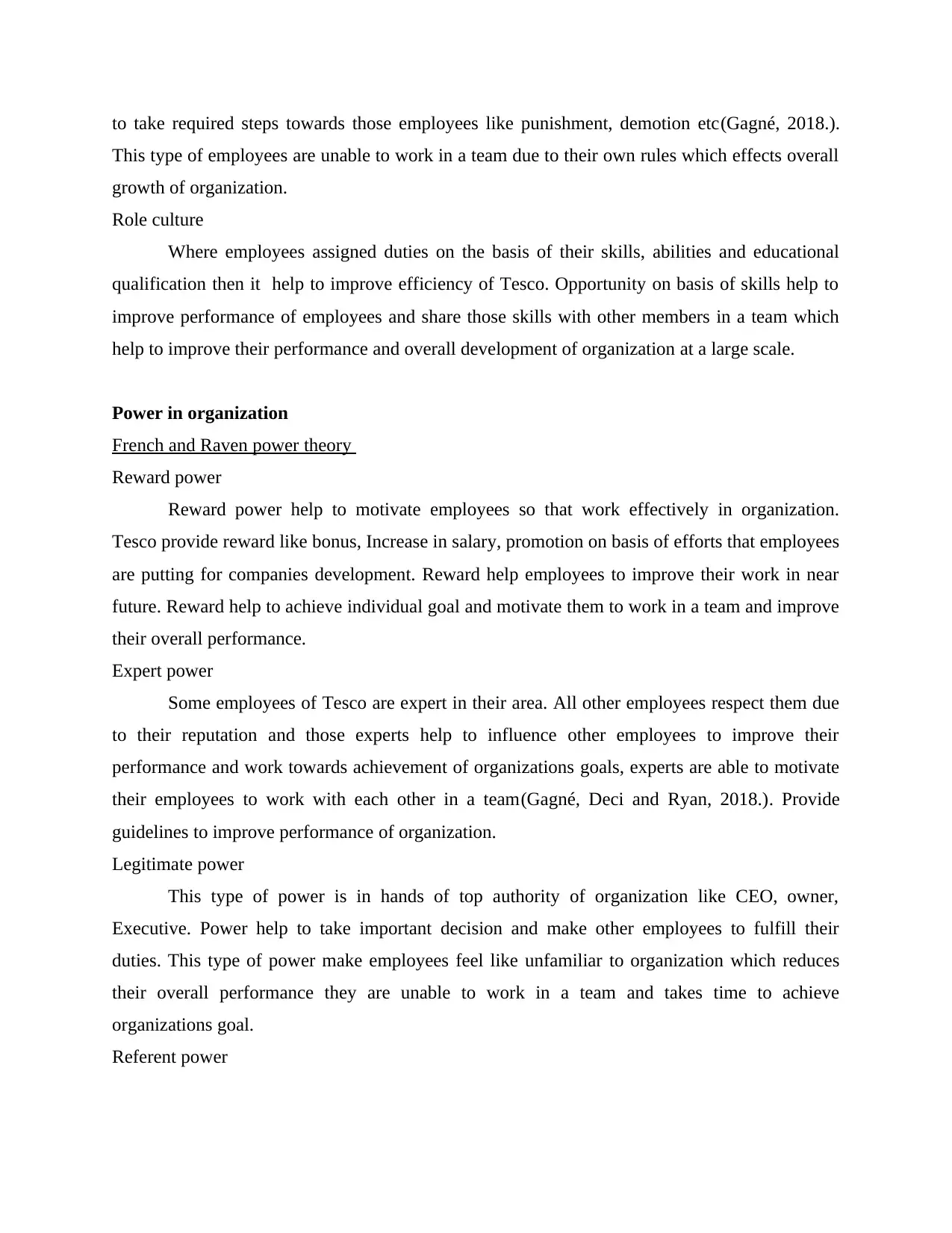
to take required steps towards those employees like punishment, demotion etc(Gagné, 2018.).
This type of employees are unable to work in a team due to their own rules which effects overall
growth of organization.
Role culture
Where employees assigned duties on the basis of their skills, abilities and educational
qualification then it help to improve efficiency of Tesco. Opportunity on basis of skills help to
improve performance of employees and share those skills with other members in a team which
help to improve their performance and overall development of organization at a large scale.
Power in organization
French and Raven power theory
Reward power
Reward power help to motivate employees so that work effectively in organization.
Tesco provide reward like bonus, Increase in salary, promotion on basis of efforts that employees
are putting for companies development. Reward help employees to improve their work in near
future. Reward help to achieve individual goal and motivate them to work in a team and improve
their overall performance.
Expert power
Some employees of Tesco are expert in their area. All other employees respect them due
to their reputation and those experts help to influence other employees to improve their
performance and work towards achievement of organizations goals, experts are able to motivate
their employees to work with each other in a team(Gagné, Deci and Ryan, 2018.). Provide
guidelines to improve performance of organization.
Legitimate power
This type of power is in hands of top authority of organization like CEO, owner,
Executive. Power help to take important decision and make other employees to fulfill their
duties. This type of power make employees feel like unfamiliar to organization which reduces
their overall performance they are unable to work in a team and takes time to achieve
organizations goal.
Referent power
This type of employees are unable to work in a team due to their own rules which effects overall
growth of organization.
Role culture
Where employees assigned duties on the basis of their skills, abilities and educational
qualification then it help to improve efficiency of Tesco. Opportunity on basis of skills help to
improve performance of employees and share those skills with other members in a team which
help to improve their performance and overall development of organization at a large scale.
Power in organization
French and Raven power theory
Reward power
Reward power help to motivate employees so that work effectively in organization.
Tesco provide reward like bonus, Increase in salary, promotion on basis of efforts that employees
are putting for companies development. Reward help employees to improve their work in near
future. Reward help to achieve individual goal and motivate them to work in a team and improve
their overall performance.
Expert power
Some employees of Tesco are expert in their area. All other employees respect them due
to their reputation and those experts help to influence other employees to improve their
performance and work towards achievement of organizations goals, experts are able to motivate
their employees to work with each other in a team(Gagné, Deci and Ryan, 2018.). Provide
guidelines to improve performance of organization.
Legitimate power
This type of power is in hands of top authority of organization like CEO, owner,
Executive. Power help to take important decision and make other employees to fulfill their
duties. This type of power make employees feel like unfamiliar to organization which reduces
their overall performance they are unable to work in a team and takes time to achieve
organizations goal.
Referent power
Paraphrase This Document
Need a fresh take? Get an instant paraphrase of this document with our AI Paraphraser
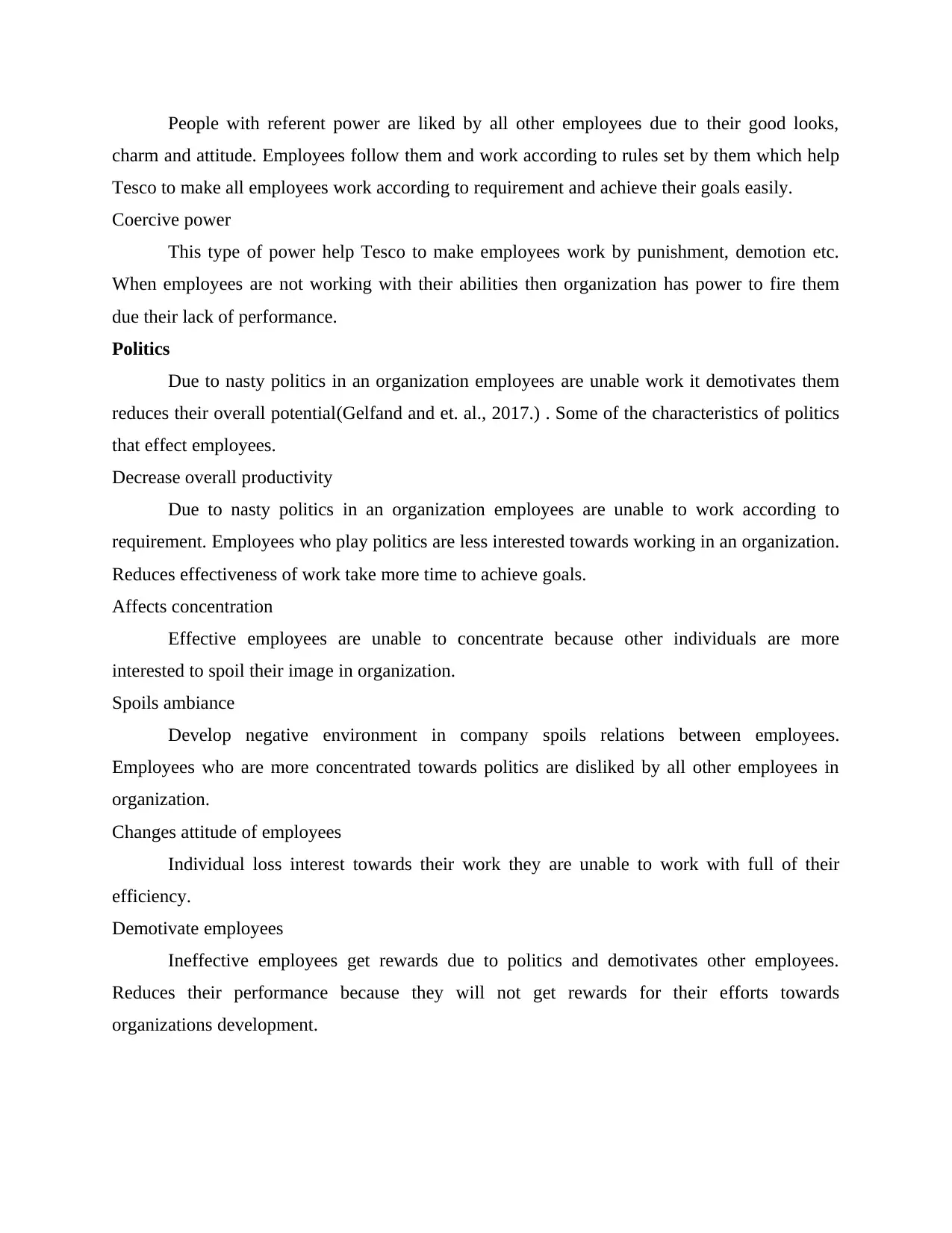
People with referent power are liked by all other employees due to their good looks,
charm and attitude. Employees follow them and work according to rules set by them which help
Tesco to make all employees work according to requirement and achieve their goals easily.
Coercive power
This type of power help Tesco to make employees work by punishment, demotion etc.
When employees are not working with their abilities then organization has power to fire them
due their lack of performance.
Politics
Due to nasty politics in an organization employees are unable work it demotivates them
reduces their overall potential(Gelfand and et. al., 2017.) . Some of the characteristics of politics
that effect employees.
Decrease overall productivity
Due to nasty politics in an organization employees are unable to work according to
requirement. Employees who play politics are less interested towards working in an organization.
Reduces effectiveness of work take more time to achieve goals.
Affects concentration
Effective employees are unable to concentrate because other individuals are more
interested to spoil their image in organization.
Spoils ambiance
Develop negative environment in company spoils relations between employees.
Employees who are more concentrated towards politics are disliked by all other employees in
organization.
Changes attitude of employees
Individual loss interest towards their work they are unable to work with full of their
efficiency.
Demotivate employees
Ineffective employees get rewards due to politics and demotivates other employees.
Reduces their performance because they will not get rewards for their efforts towards
organizations development.
charm and attitude. Employees follow them and work according to rules set by them which help
Tesco to make all employees work according to requirement and achieve their goals easily.
Coercive power
This type of power help Tesco to make employees work by punishment, demotion etc.
When employees are not working with their abilities then organization has power to fire them
due their lack of performance.
Politics
Due to nasty politics in an organization employees are unable work it demotivates them
reduces their overall potential(Gelfand and et. al., 2017.) . Some of the characteristics of politics
that effect employees.
Decrease overall productivity
Due to nasty politics in an organization employees are unable to work according to
requirement. Employees who play politics are less interested towards working in an organization.
Reduces effectiveness of work take more time to achieve goals.
Affects concentration
Effective employees are unable to concentrate because other individuals are more
interested to spoil their image in organization.
Spoils ambiance
Develop negative environment in company spoils relations between employees.
Employees who are more concentrated towards politics are disliked by all other employees in
organization.
Changes attitude of employees
Individual loss interest towards their work they are unable to work with full of their
efficiency.
Demotivate employees
Ineffective employees get rewards due to politics and demotivates other employees.
Reduces their performance because they will not get rewards for their efforts towards
organizations development.
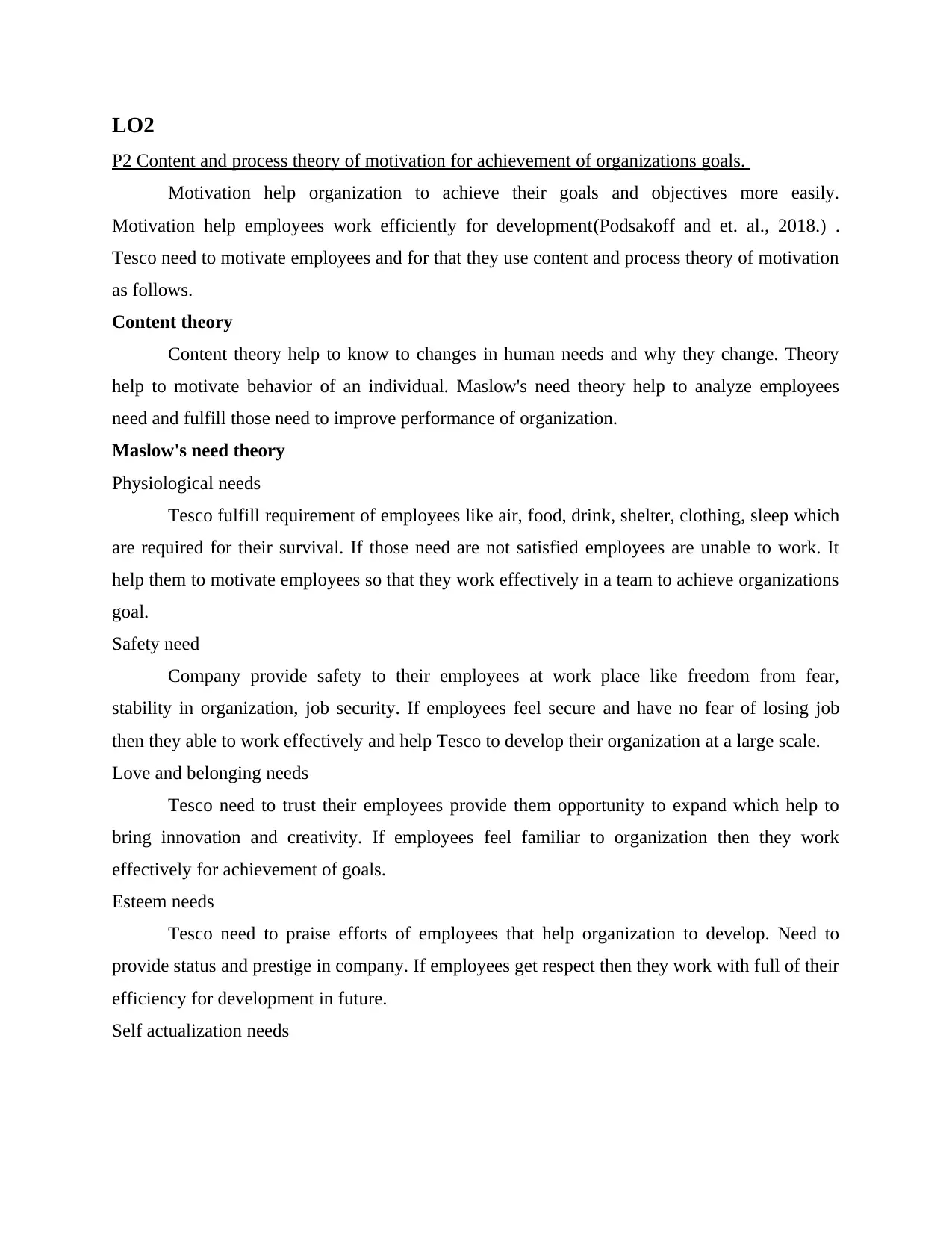
LO2
P2 Content and process theory of motivation for achievement of organizations goals.
Motivation help organization to achieve their goals and objectives more easily.
Motivation help employees work efficiently for development(Podsakoff and et. al., 2018.) .
Tesco need to motivate employees and for that they use content and process theory of motivation
as follows.
Content theory
Content theory help to know to changes in human needs and why they change. Theory
help to motivate behavior of an individual. Maslow's need theory help to analyze employees
need and fulfill those need to improve performance of organization.
Maslow's need theory
Physiological needs
Tesco fulfill requirement of employees like air, food, drink, shelter, clothing, sleep which
are required for their survival. If those need are not satisfied employees are unable to work. It
help them to motivate employees so that they work effectively in a team to achieve organizations
goal.
Safety need
Company provide safety to their employees at work place like freedom from fear,
stability in organization, job security. If employees feel secure and have no fear of losing job
then they able to work effectively and help Tesco to develop their organization at a large scale.
Love and belonging needs
Tesco need to trust their employees provide them opportunity to expand which help to
bring innovation and creativity. If employees feel familiar to organization then they work
effectively for achievement of goals.
Esteem needs
Tesco need to praise efforts of employees that help organization to develop. Need to
provide status and prestige in company. If employees get respect then they work with full of their
efficiency for development in future.
Self actualization needs
P2 Content and process theory of motivation for achievement of organizations goals.
Motivation help organization to achieve their goals and objectives more easily.
Motivation help employees work efficiently for development(Podsakoff and et. al., 2018.) .
Tesco need to motivate employees and for that they use content and process theory of motivation
as follows.
Content theory
Content theory help to know to changes in human needs and why they change. Theory
help to motivate behavior of an individual. Maslow's need theory help to analyze employees
need and fulfill those need to improve performance of organization.
Maslow's need theory
Physiological needs
Tesco fulfill requirement of employees like air, food, drink, shelter, clothing, sleep which
are required for their survival. If those need are not satisfied employees are unable to work. It
help them to motivate employees so that they work effectively in a team to achieve organizations
goal.
Safety need
Company provide safety to their employees at work place like freedom from fear,
stability in organization, job security. If employees feel secure and have no fear of losing job
then they able to work effectively and help Tesco to develop their organization at a large scale.
Love and belonging needs
Tesco need to trust their employees provide them opportunity to expand which help to
bring innovation and creativity. If employees feel familiar to organization then they work
effectively for achievement of goals.
Esteem needs
Tesco need to praise efforts of employees that help organization to develop. Need to
provide status and prestige in company. If employees get respect then they work with full of their
efficiency for development in future.
Self actualization needs
⊘ This is a preview!⊘
Do you want full access?
Subscribe today to unlock all pages.

Trusted by 1+ million students worldwide
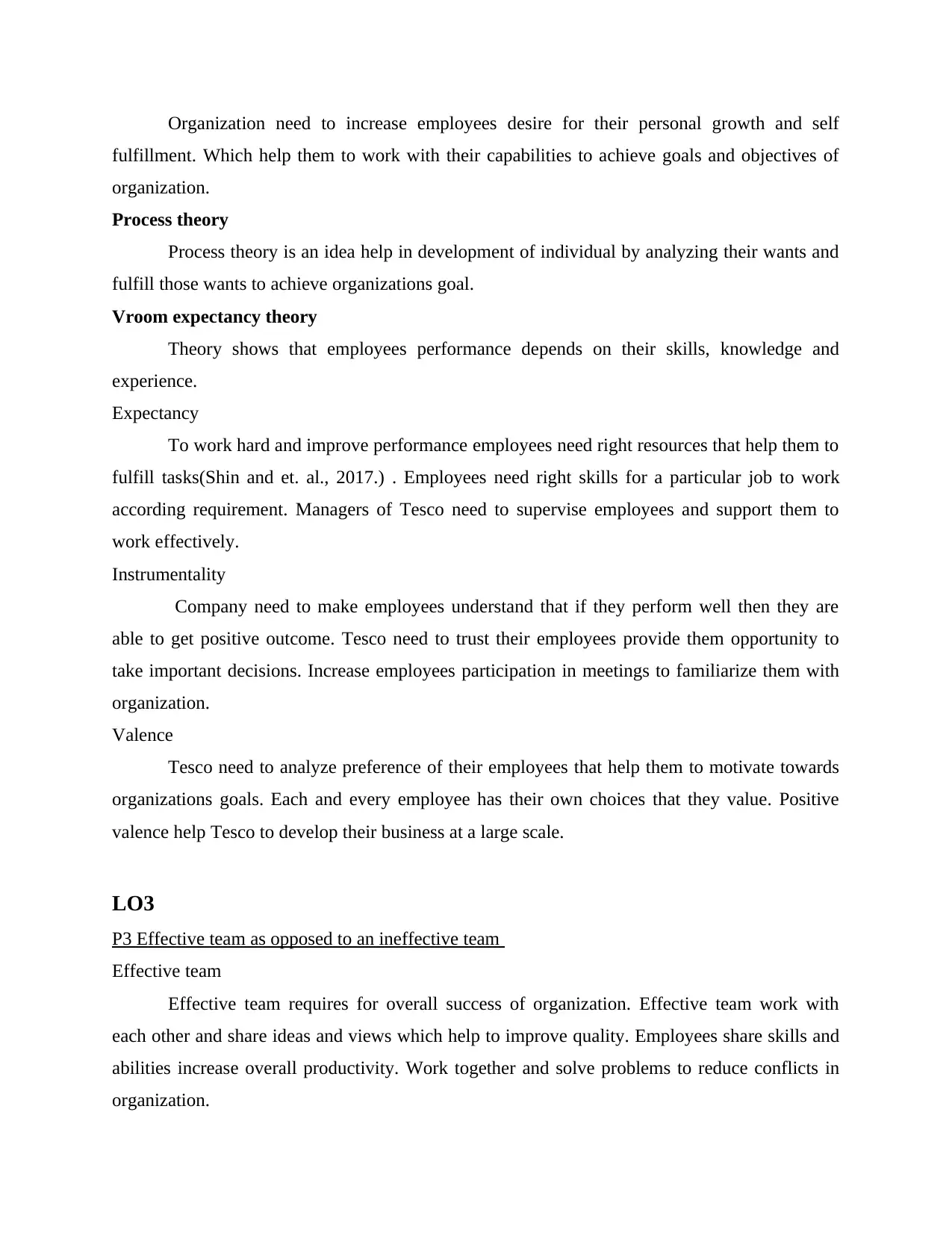
Organization need to increase employees desire for their personal growth and self
fulfillment. Which help them to work with their capabilities to achieve goals and objectives of
organization.
Process theory
Process theory is an idea help in development of individual by analyzing their wants and
fulfill those wants to achieve organizations goal.
Vroom expectancy theory
Theory shows that employees performance depends on their skills, knowledge and
experience.
Expectancy
To work hard and improve performance employees need right resources that help them to
fulfill tasks(Shin and et. al., 2017.) . Employees need right skills for a particular job to work
according requirement. Managers of Tesco need to supervise employees and support them to
work effectively.
Instrumentality
Company need to make employees understand that if they perform well then they are
able to get positive outcome. Tesco need to trust their employees provide them opportunity to
take important decisions. Increase employees participation in meetings to familiarize them with
organization.
Valence
Tesco need to analyze preference of their employees that help them to motivate towards
organizations goals. Each and every employee has their own choices that they value. Positive
valence help Tesco to develop their business at a large scale.
LO3
P3 Effective team as opposed to an ineffective team
Effective team
Effective team requires for overall success of organization. Effective team work with
each other and share ideas and views which help to improve quality. Employees share skills and
abilities increase overall productivity. Work together and solve problems to reduce conflicts in
organization.
fulfillment. Which help them to work with their capabilities to achieve goals and objectives of
organization.
Process theory
Process theory is an idea help in development of individual by analyzing their wants and
fulfill those wants to achieve organizations goal.
Vroom expectancy theory
Theory shows that employees performance depends on their skills, knowledge and
experience.
Expectancy
To work hard and improve performance employees need right resources that help them to
fulfill tasks(Shin and et. al., 2017.) . Employees need right skills for a particular job to work
according requirement. Managers of Tesco need to supervise employees and support them to
work effectively.
Instrumentality
Company need to make employees understand that if they perform well then they are
able to get positive outcome. Tesco need to trust their employees provide them opportunity to
take important decisions. Increase employees participation in meetings to familiarize them with
organization.
Valence
Tesco need to analyze preference of their employees that help them to motivate towards
organizations goals. Each and every employee has their own choices that they value. Positive
valence help Tesco to develop their business at a large scale.
LO3
P3 Effective team as opposed to an ineffective team
Effective team
Effective team requires for overall success of organization. Effective team work with
each other and share ideas and views which help to improve quality. Employees share skills and
abilities increase overall productivity. Work together and solve problems to reduce conflicts in
organization.
Paraphrase This Document
Need a fresh take? Get an instant paraphrase of this document with our AI Paraphraser
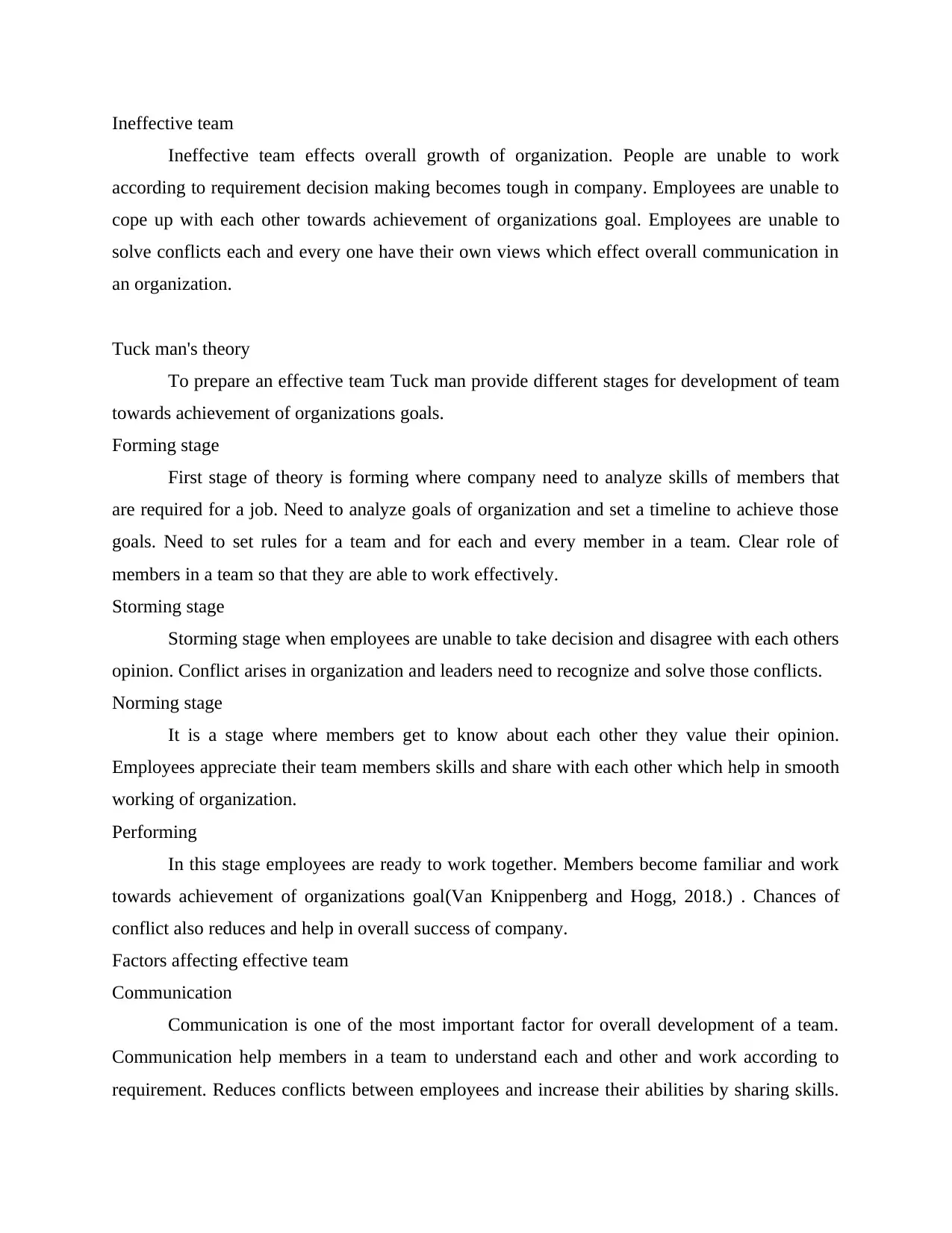
Ineffective team
Ineffective team effects overall growth of organization. People are unable to work
according to requirement decision making becomes tough in company. Employees are unable to
cope up with each other towards achievement of organizations goal. Employees are unable to
solve conflicts each and every one have their own views which effect overall communication in
an organization.
Tuck man's theory
To prepare an effective team Tuck man provide different stages for development of team
towards achievement of organizations goals.
Forming stage
First stage of theory is forming where company need to analyze skills of members that
are required for a job. Need to analyze goals of organization and set a timeline to achieve those
goals. Need to set rules for a team and for each and every member in a team. Clear role of
members in a team so that they are able to work effectively.
Storming stage
Storming stage when employees are unable to take decision and disagree with each others
opinion. Conflict arises in organization and leaders need to recognize and solve those conflicts.
Norming stage
It is a stage where members get to know about each other they value their opinion.
Employees appreciate their team members skills and share with each other which help in smooth
working of organization.
Performing
In this stage employees are ready to work together. Members become familiar and work
towards achievement of organizations goal(Van Knippenberg and Hogg, 2018.) . Chances of
conflict also reduces and help in overall success of company.
Factors affecting effective team
Communication
Communication is one of the most important factor for overall development of a team.
Communication help members in a team to understand each and other and work according to
requirement. Reduces conflicts between employees and increase their abilities by sharing skills.
Ineffective team effects overall growth of organization. People are unable to work
according to requirement decision making becomes tough in company. Employees are unable to
cope up with each other towards achievement of organizations goal. Employees are unable to
solve conflicts each and every one have their own views which effect overall communication in
an organization.
Tuck man's theory
To prepare an effective team Tuck man provide different stages for development of team
towards achievement of organizations goals.
Forming stage
First stage of theory is forming where company need to analyze skills of members that
are required for a job. Need to analyze goals of organization and set a timeline to achieve those
goals. Need to set rules for a team and for each and every member in a team. Clear role of
members in a team so that they are able to work effectively.
Storming stage
Storming stage when employees are unable to take decision and disagree with each others
opinion. Conflict arises in organization and leaders need to recognize and solve those conflicts.
Norming stage
It is a stage where members get to know about each other they value their opinion.
Employees appreciate their team members skills and share with each other which help in smooth
working of organization.
Performing
In this stage employees are ready to work together. Members become familiar and work
towards achievement of organizations goal(Van Knippenberg and Hogg, 2018.) . Chances of
conflict also reduces and help in overall success of company.
Factors affecting effective team
Communication
Communication is one of the most important factor for overall development of a team.
Communication help members in a team to understand each and other and work according to
requirement. Reduces conflicts between employees and increase their abilities by sharing skills.
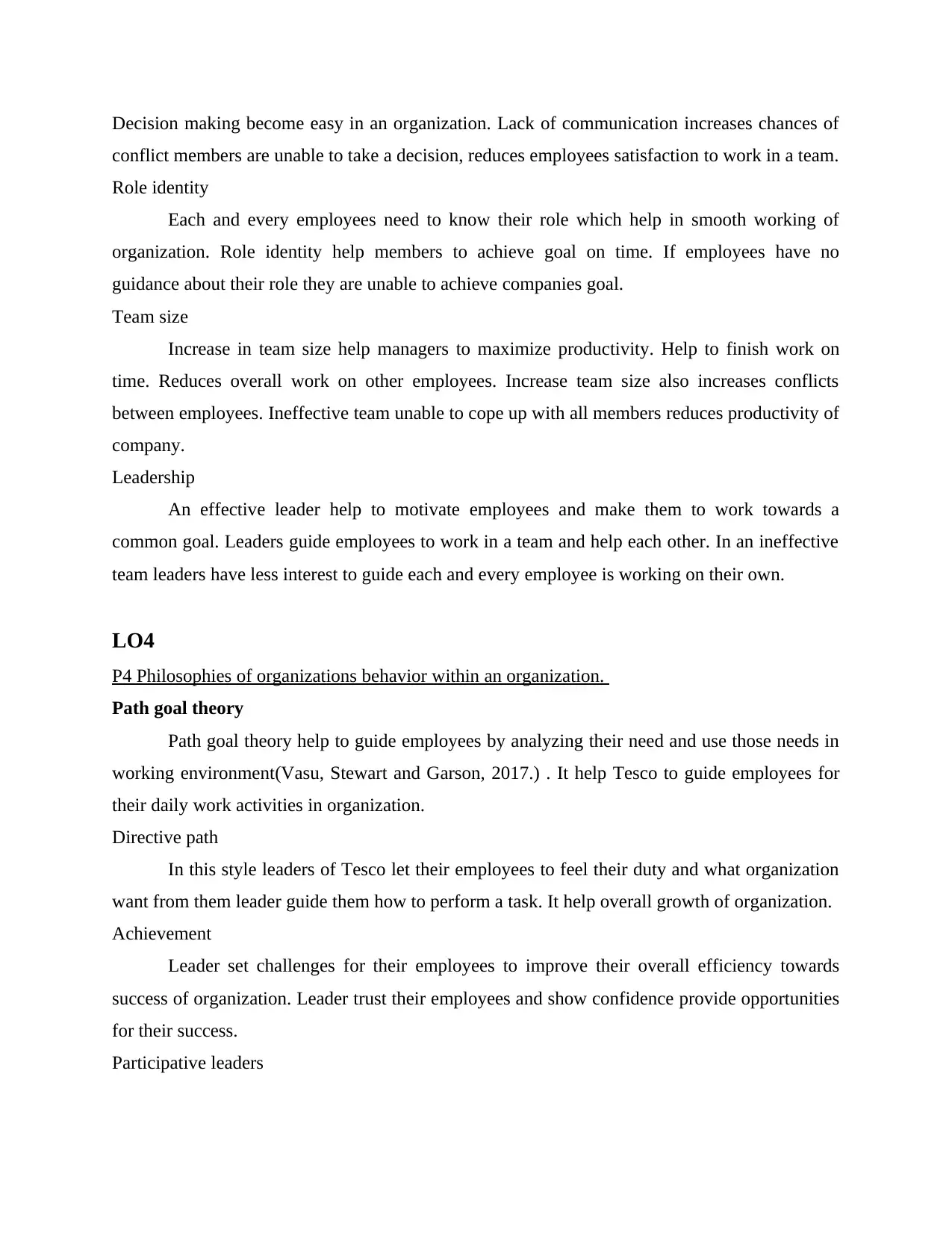
Decision making become easy in an organization. Lack of communication increases chances of
conflict members are unable to take a decision, reduces employees satisfaction to work in a team.
Role identity
Each and every employees need to know their role which help in smooth working of
organization. Role identity help members to achieve goal on time. If employees have no
guidance about their role they are unable to achieve companies goal.
Team size
Increase in team size help managers to maximize productivity. Help to finish work on
time. Reduces overall work on other employees. Increase team size also increases conflicts
between employees. Ineffective team unable to cope up with all members reduces productivity of
company.
Leadership
An effective leader help to motivate employees and make them to work towards a
common goal. Leaders guide employees to work in a team and help each other. In an ineffective
team leaders have less interest to guide each and every employee is working on their own.
LO4
P4 Philosophies of organizations behavior within an organization.
Path goal theory
Path goal theory help to guide employees by analyzing their need and use those needs in
working environment(Vasu, Stewart and Garson, 2017.) . It help Tesco to guide employees for
their daily work activities in organization.
Directive path
In this style leaders of Tesco let their employees to feel their duty and what organization
want from them leader guide them how to perform a task. It help overall growth of organization.
Achievement
Leader set challenges for their employees to improve their overall efficiency towards
success of organization. Leader trust their employees and show confidence provide opportunities
for their success.
Participative leaders
conflict members are unable to take a decision, reduces employees satisfaction to work in a team.
Role identity
Each and every employees need to know their role which help in smooth working of
organization. Role identity help members to achieve goal on time. If employees have no
guidance about their role they are unable to achieve companies goal.
Team size
Increase in team size help managers to maximize productivity. Help to finish work on
time. Reduces overall work on other employees. Increase team size also increases conflicts
between employees. Ineffective team unable to cope up with all members reduces productivity of
company.
Leadership
An effective leader help to motivate employees and make them to work towards a
common goal. Leaders guide employees to work in a team and help each other. In an ineffective
team leaders have less interest to guide each and every employee is working on their own.
LO4
P4 Philosophies of organizations behavior within an organization.
Path goal theory
Path goal theory help to guide employees by analyzing their need and use those needs in
working environment(Vasu, Stewart and Garson, 2017.) . It help Tesco to guide employees for
their daily work activities in organization.
Directive path
In this style leaders of Tesco let their employees to feel their duty and what organization
want from them leader guide them how to perform a task. It help overall growth of organization.
Achievement
Leader set challenges for their employees to improve their overall efficiency towards
success of organization. Leader trust their employees and show confidence provide opportunities
for their success.
Participative leaders
⊘ This is a preview!⊘
Do you want full access?
Subscribe today to unlock all pages.

Trusted by 1+ million students worldwide
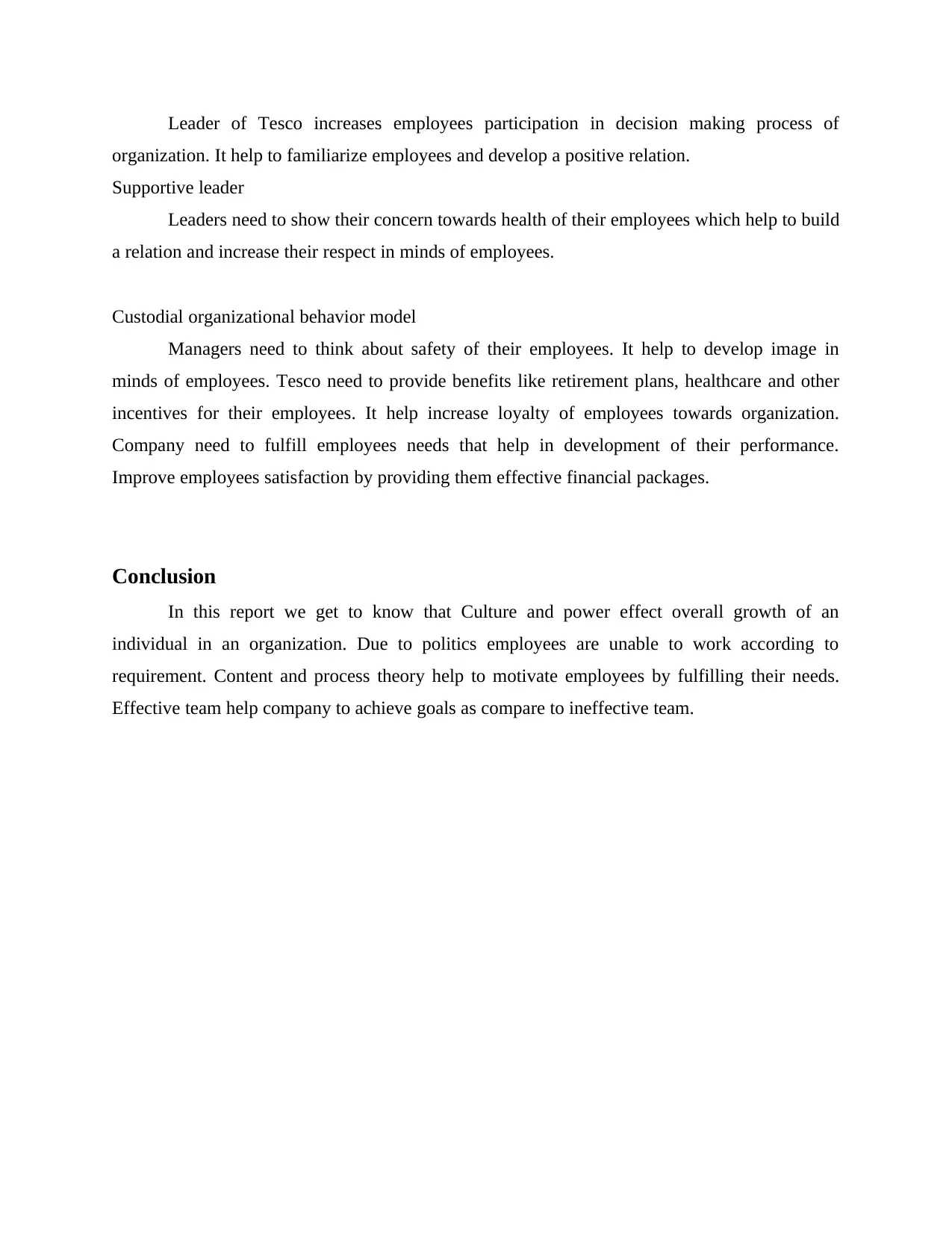
Leader of Tesco increases employees participation in decision making process of
organization. It help to familiarize employees and develop a positive relation.
Supportive leader
Leaders need to show their concern towards health of their employees which help to build
a relation and increase their respect in minds of employees.
Custodial organizational behavior model
Managers need to think about safety of their employees. It help to develop image in
minds of employees. Tesco need to provide benefits like retirement plans, healthcare and other
incentives for their employees. It help increase loyalty of employees towards organization.
Company need to fulfill employees needs that help in development of their performance.
Improve employees satisfaction by providing them effective financial packages.
Conclusion
In this report we get to know that Culture and power effect overall growth of an
individual in an organization. Due to politics employees are unable to work according to
requirement. Content and process theory help to motivate employees by fulfilling their needs.
Effective team help company to achieve goals as compare to ineffective team.
organization. It help to familiarize employees and develop a positive relation.
Supportive leader
Leaders need to show their concern towards health of their employees which help to build
a relation and increase their respect in minds of employees.
Custodial organizational behavior model
Managers need to think about safety of their employees. It help to develop image in
minds of employees. Tesco need to provide benefits like retirement plans, healthcare and other
incentives for their employees. It help increase loyalty of employees towards organization.
Company need to fulfill employees needs that help in development of their performance.
Improve employees satisfaction by providing them effective financial packages.
Conclusion
In this report we get to know that Culture and power effect overall growth of an
individual in an organization. Due to politics employees are unable to work according to
requirement. Content and process theory help to motivate employees by fulfilling their needs.
Effective team help company to achieve goals as compare to ineffective team.
Paraphrase This Document
Need a fresh take? Get an instant paraphrase of this document with our AI Paraphraser

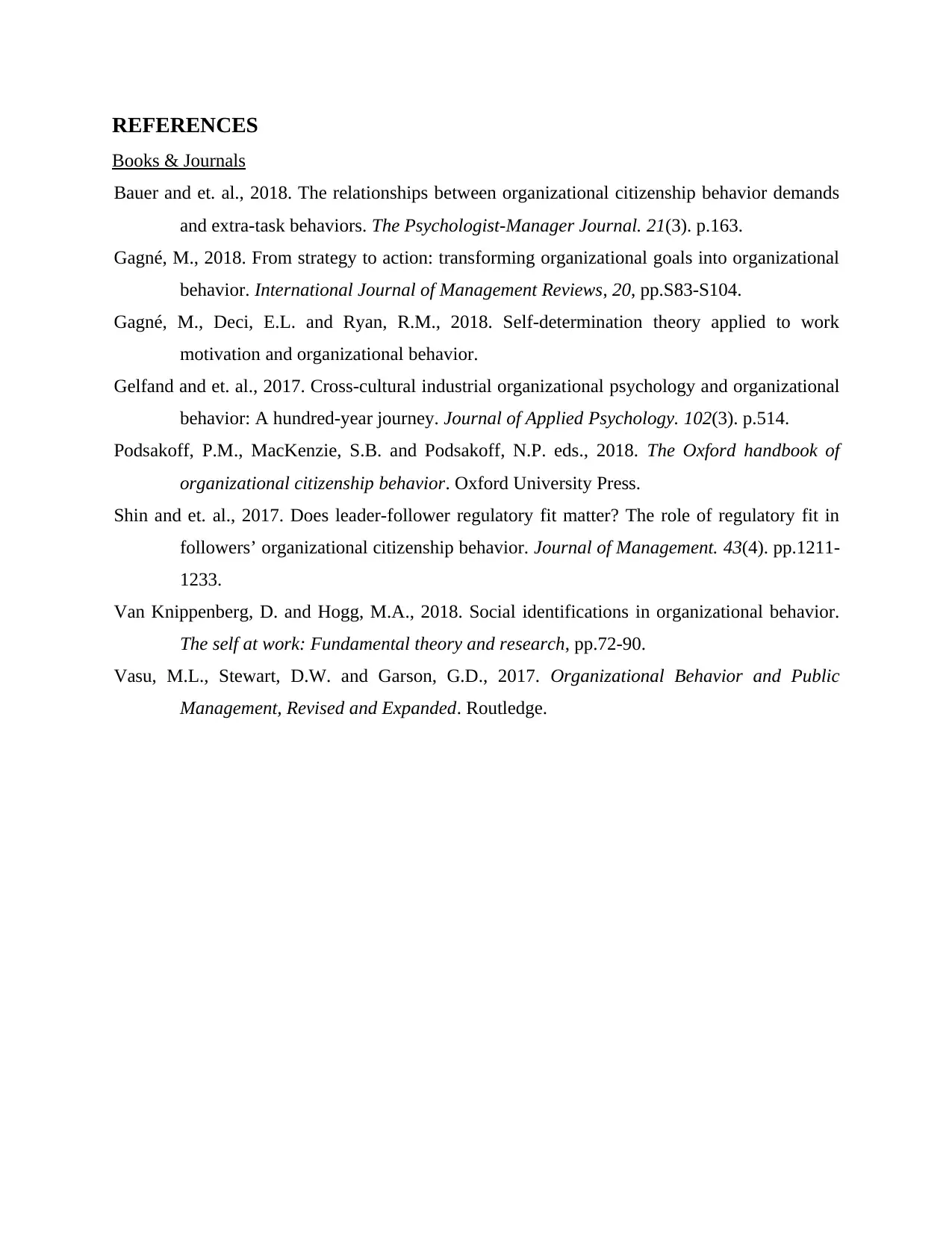
REFERENCES
Books & Journals
Bauer and et. al., 2018. The relationships between organizational citizenship behavior demands
and extra-task behaviors. The Psychologist-Manager Journal. 21(3). p.163.
Gagné, M., 2018. From strategy to action: transforming organizational goals into organizational
behavior. International Journal of Management Reviews, 20, pp.S83-S104.
Gagné, M., Deci, E.L. and Ryan, R.M., 2018. Self-determination theory applied to work
motivation and organizational behavior.
Gelfand and et. al., 2017. Cross-cultural industrial organizational psychology and organizational
behavior: A hundred-year journey. Journal of Applied Psychology. 102(3). p.514.
Podsakoff, P.M., MacKenzie, S.B. and Podsakoff, N.P. eds., 2018. The Oxford handbook of
organizational citizenship behavior. Oxford University Press.
Shin and et. al., 2017. Does leader-follower regulatory fit matter? The role of regulatory fit in
followers’ organizational citizenship behavior. Journal of Management. 43(4). pp.1211-
1233.
Van Knippenberg, D. and Hogg, M.A., 2018. Social identifications in organizational behavior.
The self at work: Fundamental theory and research, pp.72-90.
Vasu, M.L., Stewart, D.W. and Garson, G.D., 2017. Organizational Behavior and Public
Management, Revised and Expanded. Routledge.
Books & Journals
Bauer and et. al., 2018. The relationships between organizational citizenship behavior demands
and extra-task behaviors. The Psychologist-Manager Journal. 21(3). p.163.
Gagné, M., 2018. From strategy to action: transforming organizational goals into organizational
behavior. International Journal of Management Reviews, 20, pp.S83-S104.
Gagné, M., Deci, E.L. and Ryan, R.M., 2018. Self-determination theory applied to work
motivation and organizational behavior.
Gelfand and et. al., 2017. Cross-cultural industrial organizational psychology and organizational
behavior: A hundred-year journey. Journal of Applied Psychology. 102(3). p.514.
Podsakoff, P.M., MacKenzie, S.B. and Podsakoff, N.P. eds., 2018. The Oxford handbook of
organizational citizenship behavior. Oxford University Press.
Shin and et. al., 2017. Does leader-follower regulatory fit matter? The role of regulatory fit in
followers’ organizational citizenship behavior. Journal of Management. 43(4). pp.1211-
1233.
Van Knippenberg, D. and Hogg, M.A., 2018. Social identifications in organizational behavior.
The self at work: Fundamental theory and research, pp.72-90.
Vasu, M.L., Stewart, D.W. and Garson, G.D., 2017. Organizational Behavior and Public
Management, Revised and Expanded. Routledge.
⊘ This is a preview!⊘
Do you want full access?
Subscribe today to unlock all pages.

Trusted by 1+ million students worldwide
1 out of 12
Related Documents
Your All-in-One AI-Powered Toolkit for Academic Success.
+13062052269
info@desklib.com
Available 24*7 on WhatsApp / Email
![[object Object]](/_next/static/media/star-bottom.7253800d.svg)
Unlock your academic potential
Copyright © 2020–2026 A2Z Services. All Rights Reserved. Developed and managed by ZUCOL.





